Protest At DEP HQ Demands DEP Deny Water Quality Certificate
State Clean Water Act Power To Kill Pipelines Not Federally Preempted
Focus on Governor’s DEP Powers Has Political and Legal Significance
[Update: David O’Reilly of the Philly Inquirer has a good story I just saw that ran the same day as the protest (8/16/16):
[Update – David Levinsky’s Burlington County Times story gets it exactly right and with a great photo!:
The Federal Energy Regulatory Commission and New Jersey Board of Public Utilities have already approved construction of the compressor station and pipeline, but those approvals are contingent upon the projects obtaining the related environmental permits.
Bill Wolfe, an environmental activist from Bordentown Township, said New York and Connecticut have turned back FERC-approved pipeline projects due to their expected impacts on wetlands and streams.
“This is the first public protest challenging the governor to use his power under the Clean Water Act to reject these projects,” Wolfe said.
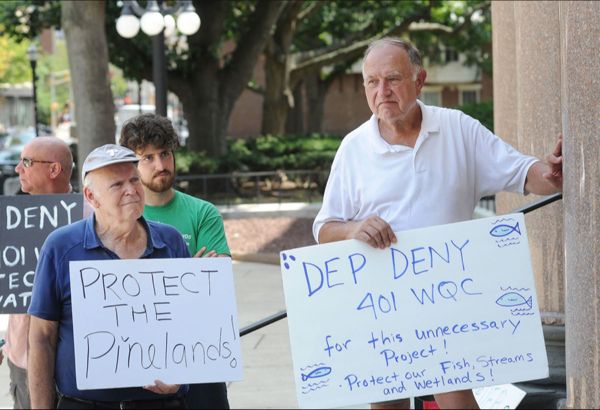
Source: William Thomas Cain for the Burlington County Times. John Kocubinski ® North Hanover Towsnhip Committeeman and Fred Fall of People Over Pipelimes (L)
Let’ hope that all the anti-pipeline, fracking, bomb train, and climate activists working so hard across the state can get get together and focus a coordinated campaign on the DEP’s Clean Water Act power. It is a far more winnable fight than FERC-ing off! ~~~ end update]
For the first time in NJ, anti-pipeline activists targeted a little known State power and today protested at the DEP’s Trenton Headquarters, demanding that DEP do its job and deny a “water quality certificate” for the compressor station and NJ Natural Gas Co.’s proposed Southern Reliability Link (SRL) pipeline through the Pinelands.
Very few people understand that the Governor has power under the Clean Water Act to deny water quality approvals and kill pipeline projects. Instead, almost all activists’ efforts and media coverage are focused on the Federal Energy Regulatory Commission (FERC), a far away beltway bureaucracy captured by the energy industry lobbyists and lawyers.
As a result, Governor Christie and his DEP have gotten a pass – DEP Commissioner Martin even misled the legislature on the DEP’s powers by suggesting that they were preempted by FERC. Martin testified to the Assembly Budget Committee on May 24, 2016:
They (FERC) are the overall controlling entity on it at the end of the day. They could over-ride anything we could even do from the State of New Jersey. […]
We can not fight that .. If we did reject a pipeline it would end up in court very quickly.
But today’s event changes all that, and – just like the Governor was pressured to use his power to kill off shore Liquified Natural Gas (LNG) projects – both the politics and the legal issues are reframed and can no longer be dodged by the Gov. or DEP Commissioner.
The protest opens up an important new political and legal front in the pipeline wars, in advance of what is sure to e a controversial public hearing on draft wetlands and water permits next Monday, August 22.
The Burlington County Times story notes that there will be two public hearings – here are details:
The first hearing will be held Monday at 6 p.m. at the Ramada Inn on Route 206 in Bordentown Township and will concern a wetlands permit sought by Williams Transco, the Oklahoma utility company that is planning to build the compressor station off Route 528 near the New Jersey Turnpike.
The second hearing is Sept. 7 at 6 p.m. at the Ramada and relates to a water permit needed by New Jersey Natural Gas for its proposed Southern Reliability Link pipeline through Chesterfield, North Hanover, Joint Base McGuire-Dix-Lakehurst, and several towns in Monmouth and Ocean counties.
Responding to activist pressure, New York State Governor Cuomo recently used his Clean Water Act Section 401 “Water Quality Certificate” power to kill the controversial proposed Constitution pipeline.
Cuomo’s denial was preceded by Connecticut, who used the State’s Clean Water Act power to kill the proposed Islander East pipeline across the Long Island Sound.
The Connecticut denial – made by then Connecticut DEP Commissioner and current EPA Administrator Gina McCarthy – was upheld by federal District Court. After the pipeline company appealed that District Court decision, the State’s denial was upheld by the US Circuit Court of Appeals.
So there is solid legal precedent to uphold NY’s more recent denial that NJ DEP can rely on as well.
Climate and anti-pipeline activists have been slow to realize the power -legally and politically – of State Clean Water Act powers to halt controversial pipeline projects.
Although the crowd was small today, activists are well advised to watch this challenge closely and join in focusing their efforts on the DEP WQC powers.
(some of the technical details can be found here and here).
Even if the activists lose this phase of the battle and the Christie DEP approves the WQC and wetlands permits, they are sure to be challenged administratively and then judicially, which will inject significant delays.
Perhaps even more importantly, there is a race for Governor now underway, and it’s only a matter of time before one of the Gubernatorial candidates realizes that a commitment to use his power as Governor to block controversial pipeline battles across the state is a winning political strategy.
NJ has a very long history of examples of exactly this dynamic – where environmental controversies are picked up by a political campaign and resolved via policy change in the next administration.
The protest was sponsor by local activist group People Over Pipelines and with the support of Sierra Club, NJ Chapter.

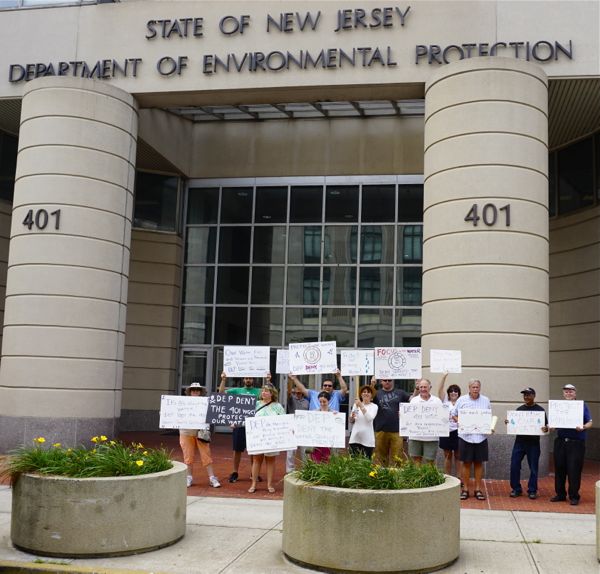
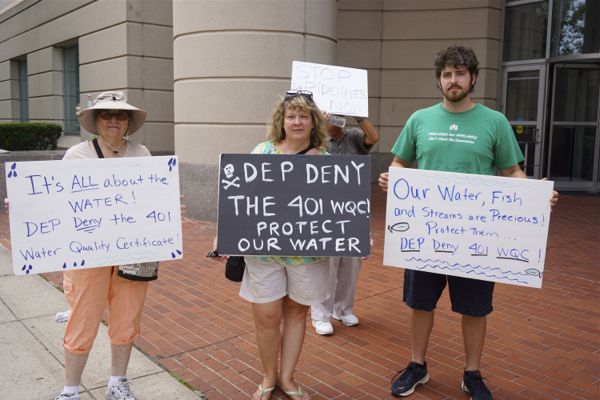
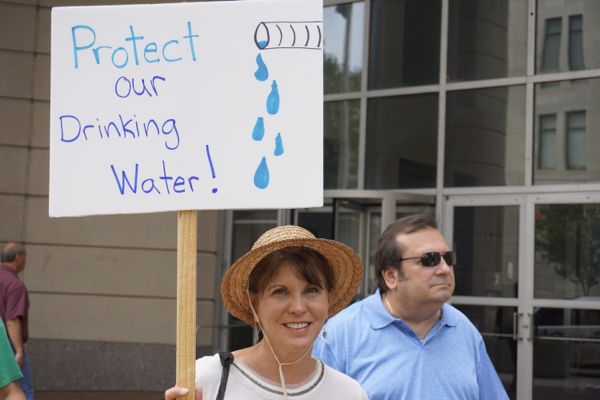
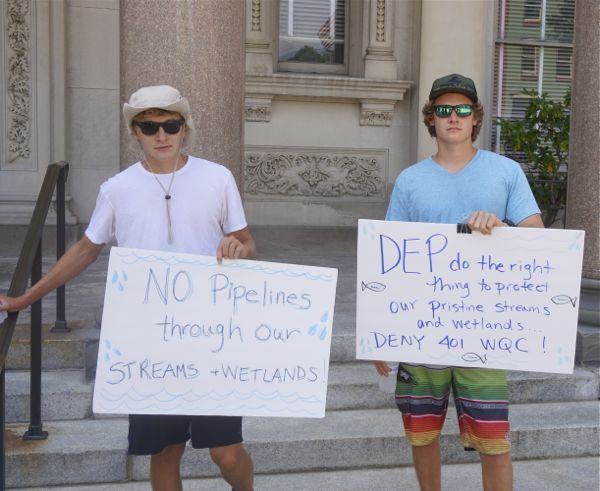
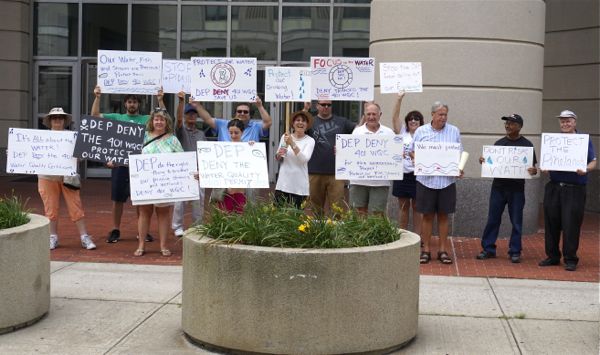
Pingback: WolfeNotes.com » Hundreds of Pipeline Opponents Force DEP To Cancel Public Hearing On Controversial Compressor Station Wetlands Permit and Clean Water Act Certificate
Pingback: WolfeNotes.com » Developing A Strategy To Move A Climate And Green Jobs Agenda
Pingback: WolfeNotes.com » As The Christie DEP Rubber Stamps Pipelines, NY Gov. Cuomo Uses Clean Water Power To Kill Another Fracking Pipeline
Pingback: WolfeNotes.com » The Strange Death Of The PennEast Pipeline – Part 1